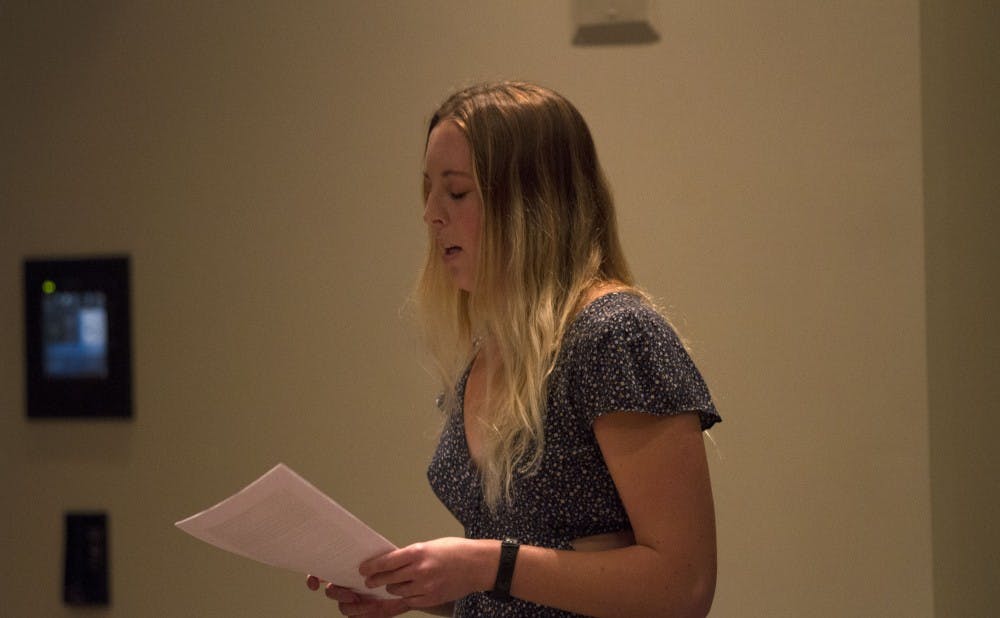One of the more solitary liberal arts, poetry tends to keep a low profile. Although Duke may not offer a creative writing major, its student body and faculty contain numerous avid poets. This literary talent was evident at the Salon, an annual public poetry reading organized by The Archive, the university’s literary magazine, Saturday.
Set in West Union’s Bolton Family Tower Room, the event attracted an eager crowd from the Duke and Durham community as four students and two faculty members presented their latest works.
“We had an amazing turnout, and I think the crowd really connected with a lot of the poems, said Daniel Egitto, a sophomore and one of the two editors-in-chief of the Archive. "These were some seriously powerful performances."
Joseph Donahue, the Helen L. Bevington Professor of the Practice of Modern Poetry, began by reading several pieces from his forthcoming collection “Windmaps.” It includes shorter poems and dramatic monologues. Like many of the other poems presented at the Salon, Donahue’s works employed dream-like sequences of experience, shifting from one subject to another in the same poem. As such, he first described a “serious young woman” gazing at a work of art, fixated on a golden cube emanating from it. Following her were short glimpses into the life of a Russian biotechnologist named Natasha, who had just been disillusioned with her life in Soviet Russia — in spite of the Cold War propaganda she had so loyally believed in. Lastly, a young boy on a subway platform appeared, dressed in his father’s clothes as a Halloween costume, only to be told by him that “you gotcha costume, now go and beg and be a bum like me.”
Next up was the evening’s first student poet, senior Zoe Abedon, who presented two new poems along with a piece titled “Worm” that had been part of The Archive’s fall 2018 issue. Like Donahue, she emphasized the importance of past dreams for her poetry, as several of them originated in dream transcriptions. This emphasis showed prominently in the lines she read, as they wound around impressions and personal feelings.
Sophomore Sarah Behn followed with several pieces, one of which centered around the object of a disposable camera. Although wasteful, it served as a symbol for the fracturing of time and memory; its flash turns the current moment into instant memory and just another step in an endless flow of time.
Theo Cai, a sophomore who is a member of The Chronicle’s editorial board, read out multiple works that focused on the purity of experience. This was reflected in the repeated use of the phrase “let’s go fishing barefoot” in his last poem, and carried on in his very personal and empathetic reflections.
The last undergraduate to read was junior Emily Otero, whose poems “PTSD” and “Lesbian” were delivered in heartfelt zeal. Like the flashbacks suffered by those affected by PTSD, her first poem jumped quickly from impression to impression, agonizing the narrator mentally and physically. Its final lines embodied the ultimate impression her poem wished to convey: “they say the devil only gets one moment/but f**k it sure is a long one for me/for me.” Although on a different topic, “Lesbian” also tackled the question of trauma and having a label attached to oneself.
Finally, Nathaniel Mackey, Reynolds Price Professor of Creative Writing, took the stage and read the 244th part of a serial poem named “Mu,” which he has been working on for most of his life. This part was titled “Words don’t go there” and had been inspired by an interview with jazz musician Charles Lloyd, in which he had described his music by saying, “Words don’t go there.” This dictum became the recurring crux of Mackey’s poem, as it explored the musical qualities of poetry, which have been a constant theme in his work.
“While it’s true that poetry doesn’t often have a ton of mass appeal, I think it gives writers a chance to connect with people in a way no other medium can,” said Egitto. “It moves, provokes, burns — and if that’s not worthwhile, I don’t know what is.”
Get The Chronicle straight to your inbox
Sign up for our weekly newsletter. Cancel at any time.

